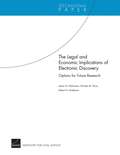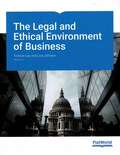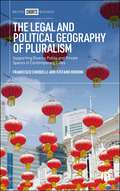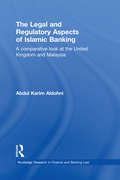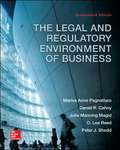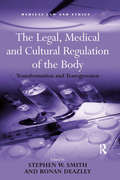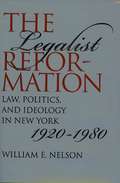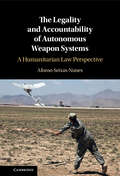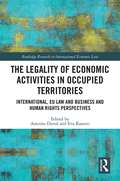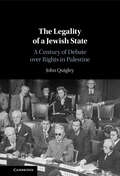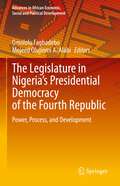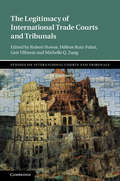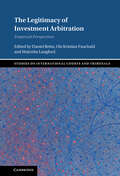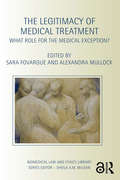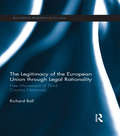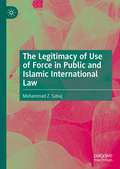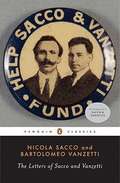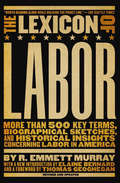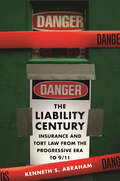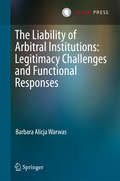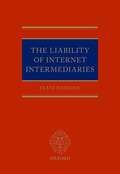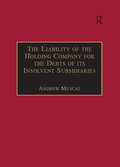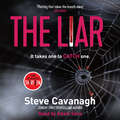- Table View
- List View
The Legal and Economic Implications of Electronic Discovery
by James N. Dertouzos Robert H. Anderson Nicholas M. PaceThe growing volume of electronically stored information has led to concerns that requests for electronic discovery (e-discovery) can increase litigation costs, impose new risks on lawyers and their clients, and alter expectations about likely court outcomes. The authors provide an overview of the issues involved and outline five avenues for future research on the legal and economic implications of e-discovery.
The Legal and Ethical Environment of Business Version 4.0
by Lisa Johnson Terence LauThe Legal and Ethical Environment of Business v4.0 is a highly accessible textbook uses summaries of cases and case excerpts to improve student understanding. Lau and Johnson are focused on getting students to understand the reason for the law rather than just memorizing the law and its key elements.
The Legal and Political Geography of Pluralism: Supporting Diverse Public and Private Spaces in Contemporary Cities
by Francesco Chiodelli Stefano MoroniIs it legitimate to prohibit political activities in a shopping centre, or the wearing of the full Islamic veil in a public space? This book addresses such questions of pluralism in a time of increasing ethnic, religious and cultural diversity in the public and private spaces of our cities. Analysing different types of regulation — property rights, municipal ordinances and urban planning — the authors reflect on the kinds of rules public institutions should accept in relation to private spaces, and should promote in relation to public spaces, in order to protect and support pluralism.
The Legal and Regulatory Aspects of Islamic Banking: A Comparative Look at the United Kingdom and Malaysia (Routledge Research in Finance and Banking Law)
by Abdul Karim AldohniDuring the last ten years the Islamic banking sector has grown rapidly, at an international level, as well as in individual jurisdictions including the UK. Islamic finance differs quite substantially from conventional banking, using very different mechanisms, and operating according to a different theory as it is based on Islamic law. Yet at the same time it is always subject to the law of the particular financial market in which it operates. This book takes a much-needed and comprehensive look at the legal and regulatory aspects which affect Islamic finance law, and examines the current UK and international banking regulatory frameworks which impact on this sector. The book examines the historical genesis of Islamic banking, looking at how it has developed in Muslim countries before going on to consider the development of Islamic banking in the UK and the legal position of Islamic banks within English law. The book explores company, contract, and some elements of tax law and traces the impact it has had on the development of Islamic banking in the UK, before going on to argue that the current legal and regulatory framework which affects the Islamic banking sector has on certain occasions had an unintended adverse impact on Islamic banking in the UK. The book also provides an overview of the Malaysian experience in relation to some of the main legal and regulatory challenges in the context of Islamic banking and finance.
The Legal and Regulatory Environment of Business (Seventeenth Edition)
by Marisa Anne Pagnattaro Daniel R. Cahoy Julie Manning Magid O. Lee Reed Peter J. SheddUsing court cases and examples in Sidebars that are relevant for business, we underscore how learning about the law is essential to understand how the law can be used for strategic advantage and how to develop sustainable business practices.
The Legal, Medical and Cultural Regulation of the Body: Transformation and Transgression (Medical Law And Ethics Ser.)
by Stephen W. SmithThe regulation of the body provides an important concern in law, medical practice and culture. This volume contributes to existing research in the area by encouraging experts from a range of related disciplines to consider the legal, cultural and medical ways in which we regulate the body, further exploring how conceptions of self, liberalism, property and harm inform and influence contentious legal and ethical questions about what we can and cannot do to or with our own bodies.
The Legalist Reformation
by William E. NelsonBased on a detailed examination of New York case law, this pathbreaking book shows how law, politics, and ideology in the state changed in tandem between 1920 and 1980. Early twentieth-century New York was the scene of intense struggle between white, Anglo-Saxon, Protestant upper and middle classes located primarily in the upstate region and the impoverished, mainly Jewish and Roman Catholic, immigrant underclass centered in New York City. Beginning in the 1920s, however, judges such as Benjamin N. Cardozo, Henry J. Friendly, Learned Hand, and Harlan Fiske Stone used law to facilitate the entry of the underclass into the economic and social mainstream and to promote tolerance among all New Yorkers.Ultimately, says William Nelson, a new legal ideology was created. By the late 1930s, New Yorkers had begun to reconceptualize social conflict not along class lines but in terms of the power of majorities and the rights of minorities. In the process, they constructed a new approach to law and politics. Though doctrinal change began to slow by the 1960s, the main ambitions of the legalist reformation--liberty, equality, human dignity, and entrepreneurial opportunity--remain the aspirations of nearly all Americans, and of much of the rest of the world, today. "This splendid book . . . sets a new and very high standard for studies of American legal history in the twentieth century.--American Historical Review"Drawing on a beautifully detailed study of thousands of court opinions and life in New York, William Nelson reveals how twentieth century common law jurists brought together the diverse racial, ethnic, and religious factions in the state.--Harvard Law Review"Nelson's vision is expansive, his research prodigious, his analysis insightful, and his achievement impressive. . . . This fresh research is scholarship of the first order, in itself a major contribution.--Journal of American History"Nowhere is the concept of the law as an evolving, dynamic, and progressive force in modern American society better espoused than in this seminal, exhaustive piece of legal and historical research.--Library JournalBased on a detailed examination of New York case law, The Legalist Reformation traces the efforts of citizens of diverse racial, ethnic, and religious backgrounds to live together in the state during the past century. William Nelson argues that the most powerful instrument facilitating these efforts has been the law of New York--law proclaimed largely by judges such as Benjamin N. Cardozo, Henry J. Friendly, and Learned Hand rather than by legislators or federal officials. Furthermore, the legal ideology outlined by New York jurists has become a standard for justice worldwide among diverse cultures whose people, like New Yorkers, are striving to coexist. -->
The Legality and Accountability of Autonomous Weapon Systems: A Humanitarian Law Perspective
by Afonso Seixas-NunesBy adopting a multi-disciplinary approach, this book provides a comprehensive analysis of the legality of the use of autonomous weapons systems under international law. It examines different arguments presented by States, roboticists and scholars to demonstrate the challenges such systems will create for the laws of war. This study examines how technology of warfare seeks to increase the dissociation of risk and communication between weapons and their human operators. Furthermore, it explains how algorithms might give rise to 'errors' on the battlefield that cannot be directly attributed to human operators. Against this backdrop, Dr Seixas-Nunes examines three distinct legal frameworks: the distinction between the legality of weapons and the laws of targeting; different mechanisms of individual accountability and the importance of recovering the category of 'dolus eventualis' for programmers and technicians and, finally, State responsibility for violations of the laws of war caused by weapons' software errors.
The Legality of Boxing: A Punch Drunk Love? (Birkbeck Law Press)
by Jack AndersonThe first book of its kind dedicated to an assessment of the legality of boxing, The Legality of Boxing: A Punch Drunk Love? assesses the legal response to prize fighting and undertakes a current analysis of the status of boxing in both criminal legal theory and practice. In this book, Anderson exposes boxing’s 'exemption' from contemporary legal and social norms. Reviewing all aspects of boxing - historical, legal, moral, ethical, philosophical, medical, racial and regulatory - he concludes that the supposition that boxing has a (consensual) immunity from the ordinary law of violence, based primarily on its social utility as a recognised sport, is not as robust as is usually assumed. It: suggests that the sport is extremely vulnerable to prosecution and might in fact already be illegal under English criminal law outlines the physical and financial exploitation suffered by individual boxers both inside and outside the ring, suggesting that standard boxing contracts are coercive thus illegal and that boxers do not give adequate levels of informed consent to participate advocates a number of fundamental reforms, including possibly that the sport will have to consider banning blows to the head proposes the creation of a national boxing commission in the US and a similar entity in the United Kingdom, which together would attempt to restore the credibility of a sport long know as the red-light district of sports administration. An excellent book, it is a must read for all those studying sports law, popular culture and the law and jurisprudence.
The Legality of Economic Activities in Occupied Territories: International, EU Law and Business and Human Rights Perspectives (Routledge Research in International Economic Law)
by Antoine Duval Eva KassotiThis edited volume explores the question of the lawfulness under international law of economic activities in occupied territories from the perspectives of international law, EU law, and business and human rights. Providing a multi-level overview of relevant practices, policies and cases, the book is divided in three parts, each dealing with how different legal fields have come to grips with the challenges brought about by the question of the lawfulness under international law of economic activities in occupied territories. The first part includes contributions pertaining to the international law dimension of the question. It contains chapters on the conjunction between jus in bello, jus ad bellum and international human rights law in the context of exploitation of natural resources in territories under belligerent occupation; on third party obligations flowing from the application of occupation law in relation to natural resources exploitation; and on State practice with regards to trading with occupied territories. The second part focuses on EU law and contains contributions that assess the EU’s approach to occupied territories and the extent to which this approach comports with the EU’s obligations under international law; contributions providing an in-depth assessment of the case-law of the CJEU on occupied territories; as well as contributions pertaining to the political considerations that may influence the legal framing of questions pertaining to occupied territories. The final part focuses on the business and human rights perspective, with chapters on investment arbitration as a means for holding the occupant accountable for its conduct towards foreign investments and investors; on the role and impact of the soft law framework governing corporate activity (such as the UN Guiding Principles) on business involvement with occupied territories; as well as a final case study on the dispute involving Israeli football activity in settlements located in the OPT and the legal responsibility of FIFA in this regard. The book will appeal to academics, practitioners and policy-makers alike.
The Legality of a Jewish State: A Century of Debate over Rights in Palestine
by John QuigleyIn The Legality of a Jewish State, the author traces the diplomatic history that led to the partition of Palestine in 1948 and the creation of Israel as a state. He argues that the fate of Palestine was not determined on the basis of principle, but by the failure of legality. In focusing on the lawyer-diplomats who pressed for and against a Jewish state at the United Nations, he offers an explanation of the effort in 1947-48 by Arab states at the UN to gain a legal opinion from the International Court of Justice about partition and the declaration of a Jewish state. Their arguments at that time may surprise a twenty-first-century reader, touching on issues that are still at the heart of the contemporary conflict in the Middle East.
The Legislature in Nigeria’s Presidential Democracy of the Fourth Republic: Power, Process, and Development (Advances in African Economic, Social and Political Development)
by Omololu Fagbadebo Mojeed Olujinmi A. AlabiThis book investigates whether legislative institutions, state and national, in Nigeria’s Fourth Republic have been able to harness constitutional powers to impact public policy. Presenting how the Nigerian state has not been able to showcase the expected dividends of presidential democracy since 1999, it analyzes the crisis of governance and its impact on political stability, social cohesion, and the livelihood of citizens. The book further discusses the depreciating infrastructure, corruption, and mismanagement of public resources, and shows how defiant attitudes of public political and bureaucratic officials define the new wave of corruption and profligacy in Nigeria, presenting this development as a result of a weakened legislature. The book displays the necessity of implementing a culture of accountability and discusses oversight mechanisms to make the executive accountable. These mechanisms are designed to ensure effective public service delivery. Finally, the book situates the legislative institutions in Nigeria within the context of the contributions of the National Assembly and the Assemblies of the State Houses to the development of this emerging democracy in Africa. The book will appeal to students and scholars of political science and public administration, as well as policy-makers and practitioners interested in a better understanding of democracy, separation of powers, governance, and Nigerian politics.
The Legitimacy of International Human Rights Regimes
by Geir Ulfstein Andreas Føllesdal Andreas Føllesdal Johan Karlsson Schaffer Johan Karlsson SchafferThe past sixty years have seen an expansion of international human rights conventions and supervisory organs, not least in Europe. While these international legal instruments have enlarged their mandate, they have also faced opposition and criticism from political actors at the state level, even in well-functioning democracies. Against the backdrop of such contestations, this book brings together prominent scholars in law, political philosophy and international relations in order to address the legitimacy of international human rights regimes as a theoretically challenging and politically salient case of international authority. It provides a unique and thorough overview of the legitimacy problems involved in the global governance of human rights.
The Legitimacy of International Trade Courts and Tribunals (Studies on International Courts and Tribunals )
by Geir Ulfstein Robert Howse Ruiz-Fabri Hélène Michelle Q. ZangThe recent rise of international trade courts and tribunals deserves systemic study and in-depth analysis. This volume gathers contributions from experts specialized in different regional adjudicators of trade disputes and scrutinizes their operations in the light of the often-debated legitimacy issues. It not only looks into prominent adjudicators that have played a significant role for global and regional integration, but it also includes the newly established and/or less-known judicial actors. Critical topics covered range from procedures and legal techniques during the adjudication process to the pre- and postadjudication matters in relation to forum selection and decision implementation. The volume features cross-cutting interdisciplinary discussions among academics and practitioners, lawyers, philosophers, and political scientists. In addition to fulfilling the research vacuum, it aims to address the challenges and opportunities faced in international trade adjudication.
The Legitimacy of Investment Arbitration: Empirical Perspectives (Studies on International Courts and Tribunals)
by Malcolm Langford Ole Kristian Fauchald Daniel BehnInternational investment arbitration remains one of the most controversial areas of globalisation and international law. This book provides a fresh contribution to the debate by adopting a thoroughly empirical approach. Based on new datasets and a range of quantitative, qualitative and computational methods, the contributors interrogate claims and counter-claims about the regime's legitimacy. The result is a nuanced picture about many of the critiques lodged against the regime, whether they be bias in arbitral decision-making, close relationships between law firms and arbitrators, absence of arbitral diversity, and excessive compensation. The book comes at a time when several national and international initiatives are under way to reform international investment arbitration. The authors discuss and analyse how the regime can be reformed and ow a process of legitimation might occur.
The Legitimacy of Medical Treatment: What Role for the Medical Exception? (Biomedical Law and Ethics Library)
by Sara Fovargue Alexandra MullockWhenever the legitimacy of a new or ethically contentious medical intervention is considered, a range of influences will determine whether the treatment becomes accepted as lawful medical treatment. The development and introduction of abortion, organ donation, gender reassignment, and non-therapeutic cosmetic surgery have, for example, all raised ethical, legal, and clinical issues. This book examines the various factors that legitimatise a medical procedure. Bringing together a range of internationally and nationally recognised academics from law, philosophy, medicine, health, economics, and sociology, the book explores the notion of a treatment, practice, or procedure being proper medical treatment, and considers the range of diverse factors which might influence the acceptance of a particular procedure as appropriate in the medical context. Contributors address such issues as clinical judgement and professional autonomy, the role of public interest, and the influence of resource allocation in decision-making. In doing so, the book explores how the law, the medical profession, and the public interact in determining whether a new or ethically contentious procedure should be regarded as legitimate. This book will be of interest and use to researchers and students of bioethics, medical law, criminal law, and the sociology of medicine. Chapter 6 of this book 'Family perspectives on proper medical treatment for people in prolonged vegetative and minimally conscious states' by Celia Kitzinger and Jenny Kitzinger is available under an open access CC BY NC ND license and can be viewed at: http://preview.ncbi.nlm.nih.gov/books/prevqa/NBK199156/ .
The Legitimacy of The European Union through Legal Rationality: Free Movement of Third Country Nationals (Routledge Research in EU Law)
by Richard BallThird country nationals (TCNs) play an important part in the economy of the European Union, reflected in the rights granted to them under European Union Law. Political expediency is however shaped by world, regional and domestic influences that in turn determine policy towards third country nationals and their legal rights to freedom of movement. This book examines the concept of political legitimacy within the European Union through the principles of legal rationality, focusing in particular on the European Union’s policy towards third country nationals. Richard Ball argues that for legal doctrine to be rational it must display the requirements of formal, instrumental and substantive rationality, each mutually exclusive and essential. In taking this position of legal rationality, the book focuses on free movement rights of TCNs within EU treaties and implementing legislation, the Area of Freedom Security and Justice, and Association Agreements. Ball concludes that the stance of European Union Law towards third country nationals lacks legitimacy, and suggests possible new directions that EU policy should take in the future.
The Legitimacy of Use of Force in Public and Islamic International Law
by Mohammad Z. SabujThis book investigates the legitimacy deficits of two potentially conflicting legal systems, namely Public and Islamic international law. It discusses the challenges that Public international law is being presented within the context of its relationship with Islamic international law. It explores how best to overcome these challenges through a comparative examination of state practices on the use of force. It highlights the legal-political legacies that evolved surrounding the claims of the legitimacy of use of force by armed non-state actors, states, and regional organizations. This book offers a critical analysis of these legacies in line with the Islamic Shari‘a law, United Nations Charter, state practices, and customs. It concludes that the legitimacy question has reached a vantage point where it cannot be answered either by Islamic or Public international law as a mutually exclusive legal system. Instead, Public international law must take a coherent approach within the existing legal framework.
The Letters of Sacco and Vanzetti
by Nicola Sacco Bartolomeo VanzettiCommemorating the eightieth anniversary of Sacco and Vanzetti's execution- with a new cover and new foreword Electrocuted in 1927 for the murder of two guards in Massachusetts, the Italian- American anarchists Nicola Sacco and Bartolomeo Vanzetti defied the verdict against them, maintaining their innocence to the end. Whether they were guilty continues to be the subject of debate today. First published in 1928, Sacco and Vanzetti's letters represent one of the great personal documents of the twentieth century: a volume of primary source material as famous for the splendor of its impassioned prose as for the brilliant light it sheds on the characters of the two dedicated anarchists who became the focus of worldwide attention. .
The Lexicon of Labor: More Than 500 Key Terms, Biographical Sketches, and Historical Insights Concerning Labor in America
by R. Emmett MurrayA thoroughly updated edition of the clever, fun-to-read compilation of union language and lore. &“Worth reading aloud while walking the picket line.&” —The Seattle Times First published in 1998, The Lexicon of Labor found a large and appreciative following among readers who were grateful to have the vibrant, powerful language of the labor movement captured in a lively single volume. This long-awaited revised and updated edition includes dozens of new terms and developments that will introduce a new generation to the labor lexicon. From Frederick Douglass to César Chávez, from the Haymarket Riots in 1886 to the Change to Win federation formed in 2005, this classic labor lexicon provides concise, enlightening sketches of over five hundred key places, people, and events in American labor history. A practical resource for students and journalists, The Lexicon of Labor is as entertaining for longtime union members seeking to get reacquainted with the traditions of the movement as it is for newcomers wishing to discover the unique language and history of unionism. The Lexicon of Labor also includes explanations of major legislative acts, definitions of key legal terminology, and complete listings of all the member unions of the AFL-CIO and independent unions in the United States. It is the perfect introduction to the history of labor in America. &“A handy reference for individuals who want an introduction to U.S. labor terminology and labor history.&” —Library Journal &“Fills a longstanding void . . . by far the largest compilation of definitions of words and phrases used in the specialized vocabulary of unionists.&” —Northwest Labor Press
The Liability Century: Insurance and Tort Law from the Progressive Era to 9/11
by Kenneth S. AbrahamKenneth Abraham explores the development and interdependency of the tort liability regime and the insurance system in the United States during the twentieth century and beyond, including the events of September 11, 2001.From its beginning late in the nineteenth century, the availability of liability insurance led to the creation of new forms of liability, heavily influenced expansion of the liabilities that already existed, and continually promoted increases in the amount of money that was awarded in tort suits. A “liability-and-insurance spiral” emerged, in which the availability of liability insurance encouraged the imposition of more liability, and, in turn, the imposition of liability encouraged the further spread of insurance.Liability insurance was not merely a source of funding for ever-greater amounts of tort liability. Liability insurers came to dominate tort litigation. They defended lawsuits against their policyholders, and they decided which cases to settle, fight, or appeal. The very idea behind insurance––that spreading losses among large numbers of policyholders is desirable––came to influence the ideology of tort law. To serve the aim of loss spreading, liability had to expand.Today the tort liability and insurance systems constantly interact, and to reform one the role of the other must be fully understood.
The Liability of Arbitral Institutions: Legitimacy Challenges and Functional Responses
by Barbara Alicja WarwasThis book offers an innovative approach to the topic of liability in international arbitration, a controversial topic that has heretofore not been fully explored in the scholarship. Arbitral institutions have recently emerged as powerful actors with new functions in and outside arbitration processes. The author proposes to shift the debate on liability from arbitrators to the arbitral institutions. The book re-evaluates the orthodox understanding of the status, functions, and responsibility of arbitral institutions and is recommended for arbitration scholars, practitioners, and students. It is argued that the current regulations regarding liability are inadequate given both the contractual obligations and the emerging public function of arbitral institutions and that institutional arbitral liability is therefore necessary. The book also links the contemporary functions of arbitral institutions to recent debates regarding legitimacy challenges in international commercial arbitration. Responding to these challenges, a model of institutional contractual liability is proposed that invites arbitral institutions to proactively regulate the scope of their liability.
The Liability of Internet Intermediaries
by Jaani Riordan<P>There is no book dedicated to the doctrines and remedies which regulate the legal liability of internet intermediaries.<P> This is surprising, given that we live in an era in which almost all communications and transactions rely upon services provided or facilitated by such intermediaries.
The Liability of the Holding Company for the Debts of its Insolvent Subsidiaries
by Andrew MuscatThis work deals with the liability of the holding company for the debts of its insolvent subsidiaries. In analyzing the current position under English law, the work challenges as outmoded and inadequate the virtual dogma that a holding company is not answerable for the debts of its insolvent subsidiaries. The study identifies four separate and distinct types of behavioural practices within corporate groups which may prejudice the interests of external creditors or otherwise constitute an abuse of the corporate form; the subservient subsidiary situation; the inadequately financed subsidiary situation; the integrated economic enterprise situation; and the group persona situation. After weighing the various arguments for and against a change in the law and concluding that reform is called for, the study proceeds to submit some radical proposals for reform. The basic thrust of the reform proposals is that in a number of well-defined situations entity law should give way to an enterprise analysis and holding company liability should be imposed for the debts of insolvent subsidiaries.
The Liar: It takes one to catch one. (Eddie Flynn Series)
by Steve CavanaghA must-read for fans of Lee Child, John Grisham and Michael Connelly. Combining gripping action and ingenious plotting, THE LIAR is the brilliant new legal thriller from the author of THE DEFENCE and THE PLEA.A MISSING CHILDWhen wealthy businessman Leonard Howell's daughter is kidnapped, the police jump on it straight away. But Howell knows this won't be straightforward - he needs someone willing to break the rules.A CRIMINAL LAWYEROnce a con artist, now a hotshot lawyer, Eddie Flynn's learnt that fast talk and sleight of hand are just as important in the courtroom are they are on the street. Knowing what it's like to lose a daughter, he'll stop at nothing to save Howell's.A CORRUPT CASEWith a client on trial for his life, and the body count rising, Eddie Flynn is starting to fear that the whole thing was a set-up from the very beginning.The only question is who is deadlier - the man who knows the truth, or the one who believes a lie? A missing girl, a desperate father and a case that threatens to destroy everyone involved - Eddie Flynn's got his work cut out in the thrilling new novel from the author of The Defence.Read by Adam Sims(p) 2017 Isis Publishing Ltd
